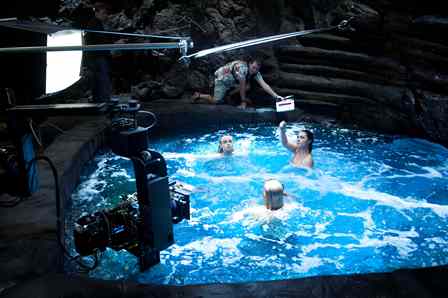Shooting Mako – Island of Secrets
When veteran cinematographer Don McAlpine gave his Raymond Longford Award acceptance speech at the 2012 AACTA luncheon he couldn’t have known that his remarks would spur producer Jonathan M. Shiff to make the leap into digital acquisition.
“I sat in the audience and saw this great master ‘Jedi’ and when he talked about his excitement of shooting Mental on digital and all of the excitement of entering an industry at this point… I just thought if this guy is so excited about digital formats, then we should make the jump.”
The then-temporary closure of the Village Roadshow Film Lab while shooting upcoming Ten series Reef Doctors (on 35mm film stock) also encouraged the producer to go digital on H20 spin-off series, Mako – Island of Secrets. After a range of camera tests, the ARRI ALEXA was selected.
“It produced really good on-screen results: it handled water and high contrast situations a lot better than I thought.”
Mako – Island of Secrets (titled Mako Mermaids for the international market) follows three mermaids: Sirena, Nixie and Lyla, who are charged with the task of protecting their magical Mako Island from trespassers. However, they are thwarted by the arrival of 16 year-old land-dweller Zac, who forms a special connection with the island and is granted a fish-like tail and amazing powers.
While shooting on film is often touted as the more expensive choice, that wasn’t the case on the $12.3 million Mako – Island of Secrets.
Jonathan M Shiff Productions’ post-production and visual effects supervisor Barry Lanfranchi says the company often got good deals on 16mm cameras because they are rarely in demand. Additional digital costs – data wranglers, memory/storage, making multiple backups of footage – more than compensated for cutting film lab processing costs, telecine dailies, and the cost of film stock itself.
“The flexibility with the ARRI ALEXA again allowed a little bit more of a ‘film’ approach on production,” he says. “The only thing is the cameras are a little bit more cumbersome because you’re using 35mm lenses and that’s another additional cost we never used to have with 16 – a big 35mm lens kit.”
While Shiff says shooting digitally was “much more expensive,” he plans to shoot the second series of Mako – Island of Secrets on the ALEXA. “Now we’ve done it, the look is super.”
The ALEXA has quickly established itself as one of the country’s most popular cameras since its launch in mid-2010. Shiff’s production team had tested a number of digital formats over the years but until the ALEXA (and the RED EPIC, which was used to film some underwater scenes) was launched, digital formats just couldn’t come close to the quality of film, Lanfranchi says.
However, no capture medium is perfect.
The production team also had to adjust for some new issues, albeit minor, produced by the digital medium, such as shooting strobing lights or lightning flashes. “I was surprised it was a relatively smooth transition – you just have to know the pitfalls.”
Post Lounge managing director and senior editor Steve Cooper says the digital format (in this case, ProRes 4:4:4, backed up to LTO drives) also eradicated another film-related issue: the film-scanning process would sometimes reveal dust spots, although the initial picture quality still requires more work in the grading process than film.
“Certainly when it comes to colour correction and final grading it’s much harder to get the final look.”
Mako – Island of Secrets will be broadcast on the Ten Network later this year. A second series is planned to shoot in the second half of 2013 (subject to Screen Australia funding).
This article first appeared in IF Magazine issue #152



